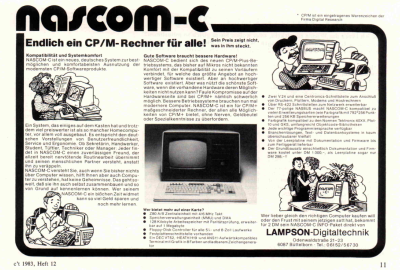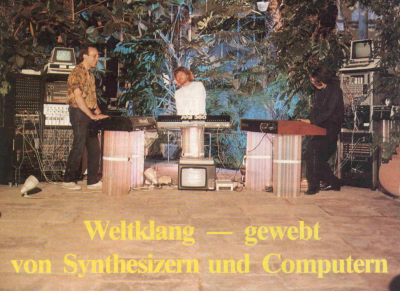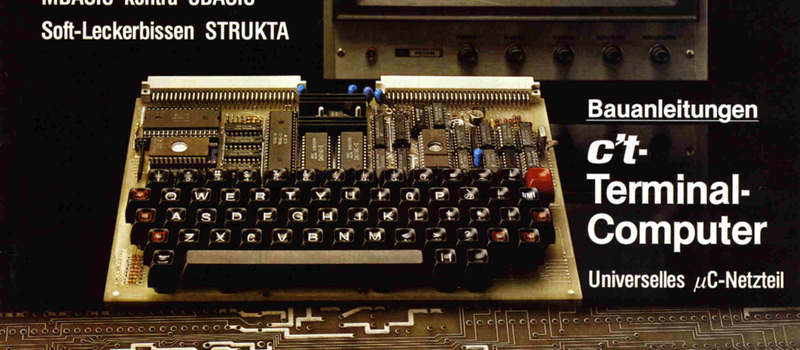Every once in a while we get nostalgic for the old days of computing. Here, we’re getting nostalgic for a past that wasn’t even our own, but will probably bring a smile to all the German hackers out there. c’t magazine has its first issue available on their website (PDF, via FTP), and it’s worth checking out even if you can’t read a word of German.
 It’s dated November/December 1983, and you’re definitely hopping in the WABAC machine here. The cover image is a terminal computer project that you’re encouraged to build for yourself, and the magazine is filled with those characteristic early-computer-era ads, many of them for the physical keyboards that you’d need to make such a device. Later on, c’t would provide plans for a complete DIY PC with plotter, one of which we saw still running at the 2015 Berlin Vintage Computer Festival.
It’s dated November/December 1983, and you’re definitely hopping in the WABAC machine here. The cover image is a terminal computer project that you’re encouraged to build for yourself, and the magazine is filled with those characteristic early-computer-era ads, many of them for the physical keyboards that you’d need to make such a device. Later on, c’t would provide plans for a complete DIY PC with plotter, one of which we saw still running at the 2015 Berlin Vintage Computer Festival.
The issue is chock-full of code for you to type out into your own computer at home. If you didn’t have a computer, there are of course reviews of all of the popular models of the day; the TRS-80 Model 100 gets good marks. And if you need to buy a BASIC interpreter, there’s an article comparing Microsoft’s MBASIC with CBM’s CBASIC. A battle royale!
 Other hot topics include modifications to make your ZX81’s video output sharper, the hassle of having to insert a coded dongle into your computer to run some software (an early anti-piracy method), and even a computer-music band that had (at least) a Commodore 64 and a CBM machine in their groovy arsenal.
Other hot topics include modifications to make your ZX81’s video output sharper, the hassle of having to insert a coded dongle into your computer to run some software (an early anti-piracy method), and even a computer-music band that had (at least) a Commodore 64 and a CBM machine in their groovy arsenal.
It’s no secret that we like old computers, and their associated magazines. Whether you prefer your PDP-11’s physical or virtual, we’ve got you covered here. And if your nostalgia leans more Anglophone, check out this Byte magazine cover re-shoot.

















Uhm, the PDF link links to the article itself?
Indeed – this is what it should link to:
ftp://ftp.heise.de/pub/ct/dokument/ct8312.pdf
Sorry about that. It should be fixed now, although we’ve noticed that ftp:// links are only supported by some browsers. Firefox works, Chrome may not.
Of course, you can use an ftp client of your choosing.
Link seems broken, here is the pdf ftp://ftp.heise.de/pub/ct/dokument/ct8312.pdf
inception :D
i always imagined back then you could get some custom hardware cranking that defeats the general purpose of today, even at only 40 megahertz.
Well, at least “rat shit” is an accurate description of what’s in your head. Let me guess, this is the new nickname of that one Troll, what was it, fuckface I think?
He wasn’t a troll, he was just a bit… brusque. Obdurate, maybe. Trolling is something you do on purpose, it doesn’t just mean “somebody I disagree with”. Keep Internet culture correct!
Mr Shit’s only telling us what he imagined. You’re allowed to imagine things. Did you never try it as a kid?
Pictures are nice.
But I would of liked them to have a English copy.
Like I said nice pictures/
c’t is a German microcomputer magazine. There’s no such thing as “a English copy”.
And “The H”, which was the English version of parts of Heise Online (publisher of c’t) closed down. not enough interest in English readers. :(
Would be nice, but if it’s about microelectronics, there are tons of literature in english available, so I guess a translation of this specific magazine isn’t necessary.
It’s different in the reverse case. I know a lot of people who are very interested in microelectronics, but due to their lack of english skills they got stuck on their level of knowledge.
For more than a decade this magazine was the source for general computer knowlege. They would cover any OS and computer architecture. And not just as editorials, but with hardware and software projects. This first edition is a good example of the things they would cover until the IBM PC took over and everything else was marginalized and in the end disappeared. I build my first 68K computer (KatCE) from this magazine and learned how to hack my Amiga too. Little of that pionering diversity remains though.
There are archives out there for the old electronics / computer books like Electronic Today International, Popular electronics and many others that I don’t remember. They are maintained by the HAM community. There is a lot more than the US literature.
I read one book and it had the pictures of making circuits by screwing components to bit’s of wood lol, took me right back to the moment.
I would actually pay a subscribe to get these old books once a month – just 30 years late lol. But that won’t happen now because print media is dead apparently.
Still, it’s cheaper. And there’s always on-demand publishing companies, you could probably send them a PDF and end up with a paper copy through your door in a couple of days.
When I was in university the library had a collection of the ham magazine QST going back to the early 1920’s. Many projects such as you describe built on wooden breadboards, and “legacy” articles on the by then obsolete but still familiar spark gap transmitters. Also “ultra high frequency” stuff that was then unlicensed because it was considered useless with admonitions about needing ceramic tube bases because the phenolic ones conducted at such high frequencies as 50 MHz.
That’s supposedly where the “breadboard” term comes from, circuits literally assembled on bread boards using screws and nails to wrap component leads and wires onto.
Try Internet Archive, they have a shiteload of old computer magazines.
Wow… this PDF is available on the web for almost two decades and has always been a so called ›popular landmark on the web‹ at least for German tech nerds and all of a sudden it features on hackaday. That escalated quickly.
I remember C’T and many of the mags back in the day. When I visited my Grandparents in Germany, I would ride the bus with them to town. At one of the stores, I had spent over 150 Deutschmarks on Electronic and computer magazines from there and bring them back home when school started. I have made a lot of friends back in school there, and we still talk about the stories back then of the crazy 80’s look of the covers, and the “Computer’s Digest” look on the insides. So…I will say this, “Das errinerung von einen frueher zeit in meinen Leben steht besser hier…auf dem Internet.” Translation: The memories from an earlier time in my life are still better here…on the internet. 73’s and ‘alles gute’ -KC8KVA